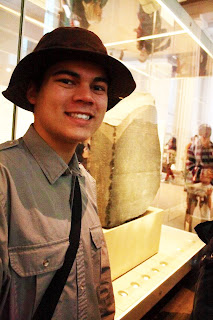I was just reading this
interesting article in the New York Times about how there is a big
disparity between data consumption of high data users and low data users. For those who didn’t read the article, the
main fact from the article is that the top one percent of cell data users
account for half of the total use. The
top 3 percent use 70 percent. Now having
read this, and as a smart phone user myself, there are a few ways I could
respond. First, I could say “that’s
interesting” and move on with my life. That
wouldn’t be worth a blog post though.
Second,
I could get jealous of those one percent people and demand more for
myself. I could try to get #OCCUPY THE
ELECRTOMAGNETIC SPECTRUM trending on Twitter. (See what I did there? If you protest banks by occupying where they operate,
you protest cell data by occupying where it operates.) Maybe I could get people all worked up and
have them demand that the government enact regulations that limit how much data
can be used by individuals in the one percent. I could demonize those that take up the
bandwidth that clearly I deserve as a living breathing human being. Inequality is unfair because we’re all
equally human beings.
But there’s
another option. I could be thankful for
my allotment of 200 megabytes per month.
It isn’t a lot, and I don’t enjoy AT&T’s overage charges or the fact
that my dad gets angry at me. But who am
I to complain? I have an iPhone for
goodness sake. Most people in the world
don’t even have cell phones. I didn’t
even have a cell phone before going college.
Last
semester, I learned the difference between absolute and relative gains. As the names imply, absolute gains pertain to
a measure made in relation to some fixed starting point while relative gains
pertain to ones measured in relation to a relative standard. If you compare yourself to those who have
more than you (a relative measure), then obviously you’ll feel shorted. It would be better to find some absolute
standard and measure your progress since then.
I find time to be a good absolute standard since you can look back at
the past, which won’t change, and measure relative to that. (It would be an absolute measure.) As mentioned before, I didn’t even have a
cell phone before going to college. I would
note that and be content that I have a phone.
This
is a parable. I’m not really talking
about cell data. I’m going to go on a
limb and guess that my readers are not in the top one percent of income
earners. So since we’re all part of “the
99%” here, I’d like to suggest that rather than complaining that there are some
super rich people out there, we should instead be thankful for what we have and
to show what we have to be thankful for, we’ll measure ourselves relative to
the past, which is absolute.
We in
the modern age enjoy quite a lovely life. Lots of things have become cheaper (adjusting
for inflation) than before due to advances in technology. I’ll make this brief and write a whole post
dedicated to how standard of living has changed over the course of time if
anyone is interested in hearing more but I’ll hit some highlights here. Think of food, for starters. A pineapple used to cost the equivalent of 4626
dollars in medieval England. Now it
costs…well I couldn’t find it in our grocery store’s flyer, but it isn’t all
that much. This is because of the
invention of refrigeration and modern shipping.
Up until recent times, if you wanted to hear music, you had to go to a
performer or have him come to you. Now we
can carry thousands of songs in our pockets and listen to them any time we want
to. A couple hundred years ago, most
people never traveled more than 20 miles away from their homes but because of
the invention of planes and cars, we can go thousands of miles in a day! Most homes have air conditioning, or can buy
a portable unit. This is a luxury that Andrew
Carnegie didn’t enjoy despite being one of the richest men of his era. This brings me to my final point. If, instead of using a relative measure, you
look at the absolute past, you’ll realize that just about all of us in modern America
are living longer, healthier, and more enjoyable lives with more leisure time
than ever before in the past. As I said
before, I could write more but this post is already getting long so I’ll only
expound more if someone requests it. I
would also recommend watching Matt
Ridley’s TED talk on this subject. He communicates a lot better than me.
At Occupy London, an encampment that understands relative differences, but doesn't understand absolute gains.



